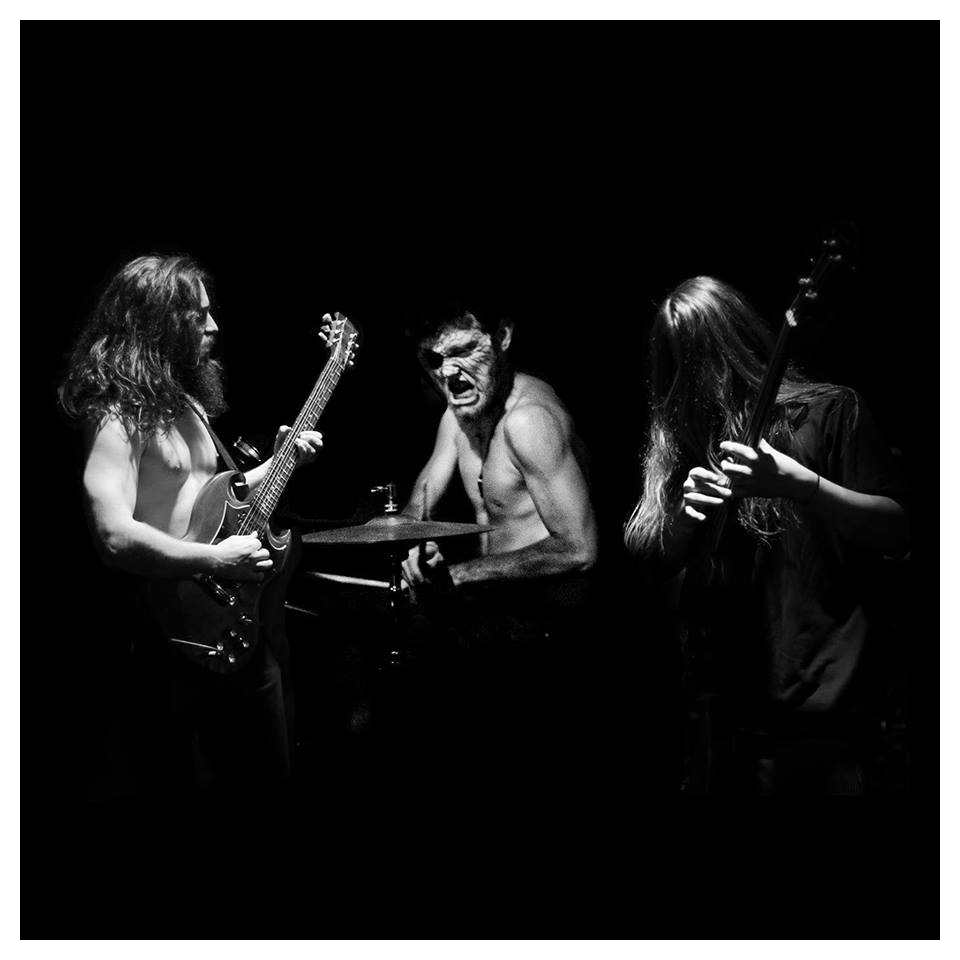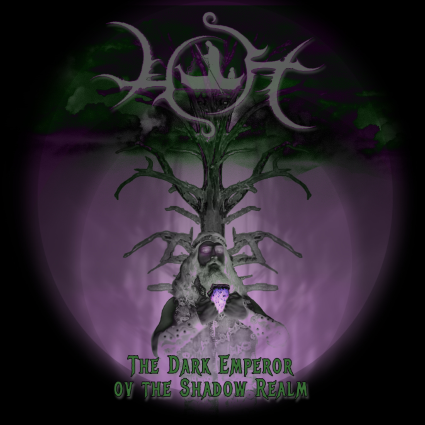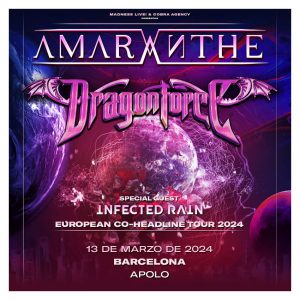HUMUT TABAL (Eng.)
1- Queens of Steel: Hello, thanks for answering to our questions. What are you guys currently up to?
Grimzaar: Currently we are preparing for the CD release party for our upcoming album, «The Dark Emperor ov the Shadow Realm». In addition to promoting the album itself, we are striving to make the show itself a memorable spectacle that brings elements of the album’s story to life.
Njord: It’s been a fast few months, organizing everything for the album, promoting our recent split with our friends Weoran, simultaneously booking and rehearsing for the summer season. We’ve been keeping busy.
2- QoS: First off, could you make some history of the band?
G: In high school I made my interest in black metal quite clear to anyone who saw or interacted with me. That is how I met Njord and Hravan; the latter was our guitarist for a long time. We all come from remote areas of the Texas Hill Country, a rugged land rife with Christian fundamentalism. We sought at first to make pure hateful black metal, both to express our frustration with our surroundings and because no one in the area at the time made true black metal. As we matured, our interests became more diverse, and we began to incorporate influences from other styles of extreme metal, particularly thrash and death metal. Our first EP «Gods ov Darkness, Hate, and Flame» focuses on a raw black metal sound with some thrash elements. Shortly afterward I began studying music in San Antonio at Trinity University, which had several effects on my compositional output. I was exposed to many different styles of art music, which led to an increased interest in polyphony. In tonal contexts, my writing became more contrapuntal, and I began contrasting these ideas with more dissonant. I talked to Njord at length about these developments and we decided to incorporate improvised, aleatoric elements into our live shows in order to demonstrate a commitment to spreading chaos. These elements are less prevalent in our recordings. Around this time we recorded our split with a great band from San Antonio, Plutonian Shore. The split is called «Oaths ov Stygian Dusk». We have two songs on the split. The first, «Smiting the Peons», is one of our older tunes. It is raw, relentless, aggressive black metal with no embellishment. Our second song on the split exhibits the aforementioned balance of counterpoint and dissonance and contains several classic death metal elements. It is called «Ode to Misanthropy: This I Swear». It opens with a free atonal section of clean guitars juxtaposed against sounds of human suffering. I had an amazing time recording that intro with the ladies who were kind enough to volunteer. Our interest in pushing musical boundaries increased when AED joined the band. He is a brilliant musician. The increasing intricacy of our music began to overwhel Hravan, who left the band shortly after we came back from playing the Os Moe is True fest in Aarschot, Belgium. While in Belgium we met Dim from Weoran, who was sitting in as a temporary bassist for Temple of Baal. Many weeks later he approached us online and proposed a split. Our material from the resulting split is a return to a more traditional black metal base, albeit with more deliberate dissonance and more developed counterpoint. One of the tracks, «Hatethrone Ascension, is a 3-voice fugue. Now we are preparing to release «Dark Emperor ov the Shadow Realm, which was actually recorded before the Plutonian Shore split. We recorded it at Horus Sound Studios in Hanover, Germany. Markus Reuter, who is a stellar progressive musician and innovative composer, produced the album. His influence really brought out the contrapuntal aspects of the compositions and added unique textural device that I hadn’t previously considered. The album features our most frequent use of thrash and death metal elements; some of the riffs are crushingly heavy. It is also unique among our recordings because of its clear production, which emphasizes both the heaviness of the death metal aspects and the somberness of the black metal.
3- QoS: How could you describe your sound?
G:We have several sounds, ranging from traditional black metal to experimental dissonant chaos. Somber melodies and fast tempos are most characteristic of our sound, although we also like to employ mid-tempo romping riffs so that we have time to put as much force into our instruments as possible. These devices remain consistent despite the varying harmonic language of our music.
N: Ever fluctuating, within the general sphere of what Grimzaar mentioned. It’s thrilling sometimes, just seeing what musical elements become entwined depending on any given moment; especially in live performance. I’d say we enjoy creating feeling amongst a crowd, shifting it, taking it away, etc. This has to lead to a relatively diverse audience, which I’m thankful for.
 4- QoS: What are the band’s main musical influences?
4- QoS: What are the band’s main musical influences?
G: Personally, as far as metal is concerned, I look to different bands for different devices. My earliest influences focused on the somber, raw black metal sound. The Darkthrone trilogy, Satyricon’s «Dark Medieval Times», Leviathan’s «The Tenth Sub Level of Suicide», Burzum’s «Hvis Lyset Tar Oss», Behexen’s «From the Devil’s Chalice», and Immortal’s «At the Heart of Winter» really influenced this aspect of my writing. Later my interest in dissonance increased, mostly due to art music. The music of Alban Berg, Anton Webern, and Bela Bartok influenced me in this direction the most. Later I discovered Krzysztof Penderecki’s instrumental compositions from the 1960s, which led me to combine my interest in dissonance with aleatoric elements. Averse Sefira’s «Battles Clarion» was also a big influence, as was Deathspell Omega’s «Fas- Ite, Maledicti, in Ignem Aeternum». For death and thrash metal, I cultivated a lot of influence from Slayer, Possessed, and Kreator.
N: All of the previously mentioned serve a vast and profound influence upon the collective sound. For percussion and battery in particular, the work of Swedish group Dissection’s earlier albums and the work of session drummer Vinnie Colaiuta have been extremely influential on me and my playing for Humut Tabal.
5- QoS: How is the feedback for your new album being?
G: Reception has been positive. People really like that the album tells a story and they like the metaphor that the story presents. I’ve received several compliments regarding how the changes in style correspond with different elements of the story, and I’ve received compliments regarding the resultant stylistic variety.
N: For our first attempt at integrating this sort of thematic, linear plot with our music to create an artistically “whole” package, yes the responses have been pleasing. We’re eager to see what different folks think, both concerning the concept and the music that expresses it.
6- QoS: And are you personally satisfied with the final outcome?
G: I am very satisfied with it. I’ve developed significantly as a result of the album, and I look forward to writing, recording, and releasing more material.
N: Absolutely. I think we really stepped out of our comfortable norm at that time both in the compositional and ideological standard. What we had amassed in the months prior to pre-production, some of the stuff that Grimzaar began writing immediately afterward as well, was demanding, invigorating and bursting with new ideas that would eventually become trademarks of our sound. There were so many different techniques present, it was a little overwhelming, and it definitely required some serious study. That was definitely a first as well as a wonderful turning point in my personal playing. Being able to fully flesh out all of the pieces and hear them all conglomerating and fusing on the first few playback takes; that was really special. Our producers for the record, Markus Reuter & Adrian Benavides, were really fun to work with. We’d bounce things off of them and they would come back with some very insightful ideas. It was a glorious learning experience.
7- QoS: How could you describe this opus in just 3 words?
G: Adversity, destruction, transcendence.
N: Hamartia, nemesis, enlightenment.
8- QoS: How has the production process for your new release been?
G: It was a slow process that required great diligence, especially after the recording was completed. Since I recorded most of the parts myself, perfecting the music for live performance was quite a chore, especially with all of the changes in lineup we’ve had. AED’s joining the band is what really enabled us to bring the album to the stage. In addition, finding someone who was willing to create artwork that accurately conveyed the album’s message proved to be more difficult than expected. We were quite fortunate to befriend Mavro Asteri Studios and get the artwork that we had envisioned all along. Consequently, the artwork was completed pretty recently, and we were finally able to get physical copies of the album shortly afterward.
N: With all of the arduousness that followed in post production, it’s a great relief to finally be able to deliver the goods, so to speak. When we were in Hanover recording, it was the exact opposite. Those sessions flew by, but I suppose that’s unavoidable when you’re looking at 12 hour tracking blocks per day. Early to rise, late to rest, for two weeks straight. We had a grand time tracking. At the suggestion of Markus, we broke down the compositions into sectional areas and left no stone unturned with the drum takes. This allowed me to really explore the vitality and aggression in the parts and find the sounds that we knew were just right, without feeling limited by letting some of the magic go due to a suffocated or static one take. Waking up in the morning and walking into Horus’ gigantic drum room, seeing the big, carpeted density wall on wheels with Tom G. Warrior’s signature right in the middle with all the others…that was really comfortable. The atmosphere was right. Our engineers, Benny & Merko, were so fluid. There was no communication breakdown or anything like that, everyone was on the same level creatively- we all wanted to see what kind of beast we could construct. I think that’s one of the things
that’s a definite marker of a great session, and without it, I doubt we’d have gotten a Dark Emperor to truly be proud of.
9- QoS: And how do you use to work on the songwriting?
G: I have two approaches to songwriting. Often I write lyrics first and the compose music that fits the sentiment of the lyrics. Other times I will have a single idea and a feeling inspired by it, and the rest of the music grows from that like bamboo sprouting from a seed.
10 – QoS: Finally, what are you near-future plans?
G: We plan to vigilantly promote this album and learn from our experiences from doing so. We hope to spread our message through performance and discussion and collaborate with as many likeminded top-notch musicians as possible.
N: Once Dark Emperor is released, we’ll be pushing it around as far as we can and continue to showcase the material in live performance, no doubt with some interesting fluctuations or related ideas. We enjoy collaboration, so keep an eye out for some special projects in the future. You can never tell what this band may bury its nails in next.
11- QoS: That’s all from our side, thanks again for taking your time to answer our questions. If you now want to add some final words; feel free to do it.
G: I will take this opportunity to summarize the album’s message by paraphrasing Laozi: Mighty is he who has mastered others; mightier still is he who has mastered himself.
N: Thanks for speaking with us. I’d like to contribute a bit of Chuang Tzu in relation to Grimzaar’s paraphrase: “Though the grease burns out of the torch, the fire passes on, and no one knows where it ends.”








